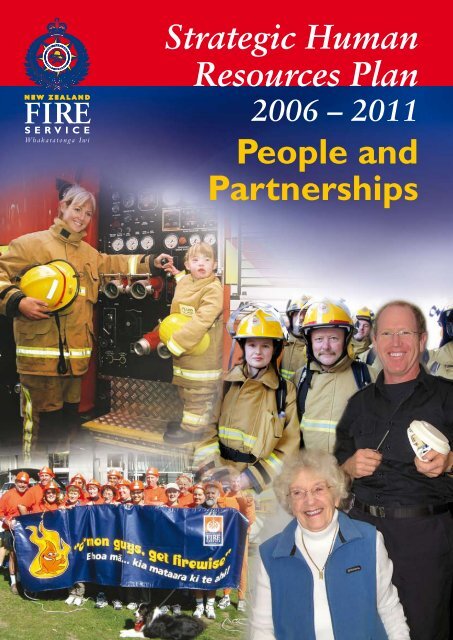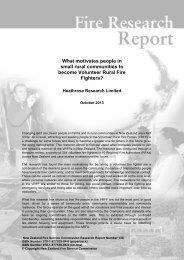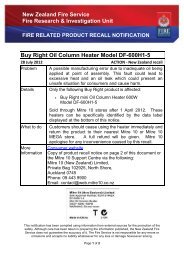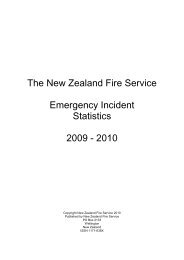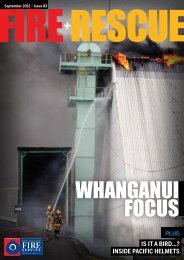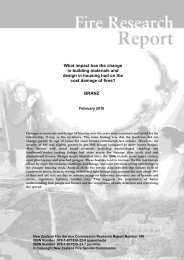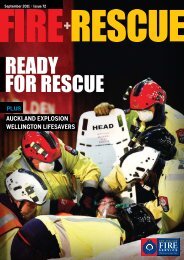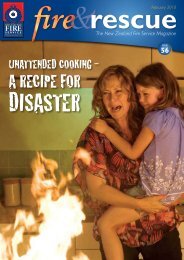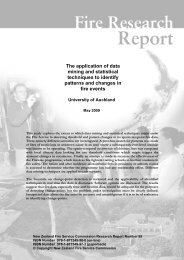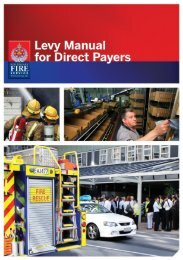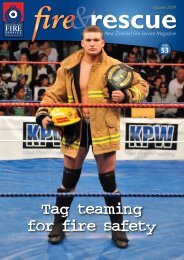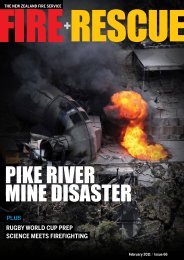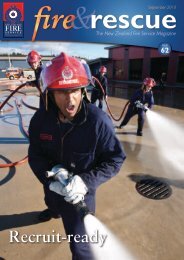Strategic Human Resources Plan 2006 - New Zealand Fire Service
Strategic Human Resources Plan 2006 - New Zealand Fire Service
Strategic Human Resources Plan 2006 - New Zealand Fire Service
You also want an ePaper? Increase the reach of your titles
YUMPU automatically turns print PDFs into web optimized ePapers that Google loves.
<strong>Strategic</strong> <strong>Human</strong><br />
<strong>Resources</strong> <strong>Plan</strong><br />
<strong>2006</strong> – 2011<br />
People and<br />
Partnerships
The <strong>New</strong> <strong>Zealand</strong> <strong>Fire</strong> <strong>Service</strong> (NZFS) exists to reduce the incidence and consequence of fires and<br />
to provide a professional response to other emergencies. In doing so, the NZFS contributes to the<br />
government’s goal of “building safer communities” by “working in partnership with communities”.<br />
Our Vision “Working with communities to protect what they value.”<br />
Our Mission “To reduce the incidence and consequence of fire and to provide<br />
a professional response to other emergencies.”<br />
Our Values • Serving our communities • Skill • Adaptability<br />
• Integrity • Comradeship<br />
People are central to the achievement of the organisation’s mission and vision. This is reflected in the<br />
importance placed in the overall <strong>Strategic</strong> <strong>Plan</strong> on “develop and protect our people and promote<br />
internal stakeholder partnerships”.<br />
Each year the <strong>Human</strong> <strong>Resources</strong> Strategy Group (HRSG) undertake a comprehensive environmental<br />
scan, and review the priorities and themes of the NZFS human resources plan. In reviewing the plan,<br />
the HRSG considers a number of internal sources of information, including:<br />
• the All Personnel Survey;<br />
• the outcomes from Partnership Conferences with representative groups<br />
(NZ Professional <strong>Fire</strong>fighters’ Union/United <strong>Fire</strong> Brigades Association);<br />
• demographic information on our volunteers and career staff;<br />
• strategy plans in the areas of equal employment opportunities, health and safety and training;<br />
• the NZFS Commission 5 Year <strong>Strategic</strong> <strong>Plan</strong>;<br />
• organisational results as reflected in the Chief Executive’s report;<br />
• exit interview data on career and volunteers;<br />
• the leadership/360° Survey;<br />
• opportunities for improvement arising from Business Excellence;<br />
• input from other groups (Training, Health & Safety, and Diversity & Fairness)<br />
• risk management analysis.<br />
This is the third <strong>Strategic</strong> <strong>Human</strong> Resource <strong>Plan</strong> (<strong>2006</strong>-2011) developed by the HRSG with input<br />
from the <strong>Fire</strong> <strong>Service</strong>’s <strong>Human</strong> Resource Team.<br />
The <strong>Strategic</strong> <strong>Human</strong> <strong>Resources</strong> <strong>Plan</strong> (<strong>2006</strong>-2011) is the foundation for annual business plans in<br />
respect of human resources. The document is designed to set out a national programme of activities,<br />
along with suggestions for complementary local initiatives. It sets the <strong>Strategic</strong> HR framework within<br />
which other activities, such as training, health and safety, and Diversity & Fairness, establish their plans.<br />
Chief Executive/National Commander<br />
June <strong>2006</strong><br />
Photograph of four firefighters on cover courtesy Nelson Mail<br />
Preface<br />
<strong>Strategic</strong> <strong>Human</strong> <strong>Resources</strong> <strong>Plan</strong> <strong>2006</strong>-2011
There are a number of significant organisational, societal and legislative changes facing the organisation<br />
in the period covered by this <strong>Strategic</strong> <strong>Human</strong> <strong>Resources</strong> <strong>Plan</strong>. These are:<br />
• Potential changes to the legislation governing the <strong>Fire</strong> <strong>Service</strong> in the form of a new Act that is<br />
intended to establish a unitary fire service with a wider emphasis on both fire and rescue,<br />
together with a new funding system;<br />
• continuing social pressures impacting on the ability of volunteer brigades to recruit and<br />
retain volunteers;<br />
• the capacity of the workforce to keep pace with changing roles and expectations of the <strong>Fire</strong> <strong>Service</strong>;<br />
• the need to manage the effects of increased workforce diversity and maintain the drive to<br />
recruit from non-traditional groups within society;<br />
• changing community risk profiles and the challenge of adjusting our resources to meet these<br />
changes;<br />
• changes in legislation, including increased health and safety obligations, good faith obligations and<br />
minimum employment entitlements that have direct financial implications;<br />
• a tight labour market and skill shortages in certain areas; and<br />
• the special needs and expectations of groups of employees and volunteers.<br />
Feedback<br />
Introduction<br />
Comments and suggestions regarding this plan are welcome. Please refer any comments to<br />
Vincent Arbuckle via e-mail (Vince.Arbuckle@fire.org.nz).<br />
<strong>Strategic</strong> <strong>Human</strong> <strong>Resources</strong> <strong>Plan</strong> <strong>2006</strong>-2011
<strong>Strategic</strong><br />
Priority<br />
People &<br />
Partnerships<br />
Overview of Strategy<br />
Key Strategies Description of Key Strategies<br />
1.0 Develop & enhance the<br />
capability of volunteer<br />
fire brigades to deliver<br />
the organisation’s<br />
strategic direction.<br />
2.0 Develop a workforce<br />
that is reflective of, and<br />
responsive to, the<br />
community<br />
3.0 Equip and train our<br />
people to serve the<br />
community<br />
4.0 Develop strong and<br />
effective leaders<br />
5.0 Create fulfilling and<br />
satisfying careers for all<br />
personnel<br />
6.0 Partnerships and<br />
cohesion for an effective<br />
organisation<br />
1.1 Develop human resource management systems and structures<br />
that assist brigades to better fulfil their agreements of service with<br />
the Commission.<br />
1.2 Assist brigades to address recruitment and retention through<br />
practical resources, guidance and personnel systems.<br />
2.1 Ensure that the <strong>Fire</strong> <strong>Service</strong> recruits and retains a more diverse<br />
workforce.<br />
2.2 Engage and align the workforce with the organisation’s mission,<br />
vision and values.<br />
2.3 Develop improved systems for workforce planning.<br />
2.4 Develop the capability of all employees and volunteers to interact<br />
with the community effectively, in particular, at-risk groups.<br />
3.1 Establish training and development systems that equip all<br />
personnel for their respective roles.<br />
3.2 Maintain a safe and healthy working environment.<br />
3.3 Develop work systems and equipment that better enable our<br />
people to perform effectively.<br />
4.1 Promote and encourage management and leadership behaviours<br />
that are aligned with the organisation’s values and direction.<br />
4.2 Nurture future leaders to provide a ready pool of talent for<br />
succession planning.<br />
4.3 Develop the capability to anticipate and better manage change.<br />
4.4 Provide management systems, guidelines, information and policies<br />
that support effective management.<br />
4.5 Provide systems for leaders to manage performance.<br />
4.6 Provide leadership programmes that equip existing and future<br />
leaders for their roles.<br />
5.1 Develop and maintain systems to listen, respond and communicate<br />
with our people.<br />
5.2 Develop flexible structures and job designs that promote our<br />
people’s motivation, satisfaction and wellbeing.<br />
5.3 Manage the “brand perception” of the <strong>Fire</strong> <strong>Service</strong> as the preferred<br />
emergency service for both employees and volunteers.<br />
6.1 Promote regular opportunities to partner with employee and<br />
volunteer representative groups (UFBA, NZPFU, Chiefs’ Society, PSA).<br />
6.2 Encourage co-operation and cohesion across the <strong>Fire</strong> <strong>Service</strong>,<br />
including positive working relationships between employee and<br />
volunteer personnel.<br />
<strong>Strategic</strong> <strong>Human</strong> <strong>Resources</strong> <strong>Plan</strong> <strong>2006</strong>-2011
Key Strategy 1<br />
.0 Develop and enhance the capability of volunteer brigades<br />
to deliver the organisation’s strategic direction.<br />
1.1 Develop human resource management systems and structures<br />
that assist brigades to better fulfill their agreements for service<br />
with the Commission.<br />
1.2 Assist brigades to address recruitment and retention through<br />
practical resources, guidance and personnel systems.<br />
<strong>Strategic</strong> <strong>Human</strong> <strong>Resources</strong> <strong>Plan</strong> <strong>2006</strong>-2011
. Develop human resource management systems and<br />
structures that assist brigades to better fulfil their<br />
agreements of service with the Commission.<br />
( establishment ongoing )<br />
1.1.1 Maintain volunteer data in<br />
HRMIS and extend<br />
Employee Kiosk to<br />
accommodate volunteers<br />
via remote access.<br />
1.1.2 Maintain and promote<br />
volunteer HR advice<br />
0800 number.<br />
1.1.3 Develop a consistent<br />
Volunteer CFO/DCFO<br />
selection system.<br />
1.1.4 Establish a national<br />
Volunteer CFO/DCFOs<br />
induction programme.<br />
1.1.5 Review and expand the<br />
Volunteer Chief <strong>Fire</strong><br />
Officers’ Personnel Manual<br />
& guidelines.<br />
1.1.6 Develop formal guidelines<br />
& policies for the care of<br />
minors in volunteer brigades.<br />
Local Initiatives<br />
<strong>2006</strong>/07 2007/08 2008/09 2009/10 2010/11 Responsibility<br />
• Regions to continue emphasis on leadership and management competencies in selecting<br />
Chief and Deputy Chief <strong>Fire</strong> Officers.<br />
• Continue and expand opportunities for senior volunteer leaders to develop volunteer<br />
management skills through special projects, Chief <strong>Fire</strong> Officers’ forums and meetings.<br />
• Volunteer brigades to recruit for specific skill sets in people management, and other<br />
administrative functions.<br />
• Contribute to the maintenance of accurate volunteer data in the HRMIS.<br />
DHR<br />
DHR<br />
DHR<br />
DHR<br />
DHR<br />
DHR<br />
<strong>Strategic</strong> <strong>Human</strong> <strong>Resources</strong> <strong>Plan</strong> <strong>2006</strong>-2011
. Assist brigades to address recruitment and retention through<br />
practical resources, guidance and personnel systems.<br />
( establishment ongoing )<br />
1.2.1 Maintain research into<br />
resignations from<br />
volunteer brigades.<br />
1.2.2 Develop revised<br />
recruitment and selection<br />
system for volunteers.<br />
1.2.3 Revamp and expand<br />
recruitment materials<br />
and resources.<br />
1.2.4 Convene annual VSO<br />
representative forum, and<br />
promote professional<br />
development amongst<br />
VSOs.<br />
1.2.5 Develop enhanced<br />
employer recognition<br />
systems (subject to pilot).<br />
1.2.6 Review overall reward<br />
and recognition systems<br />
including gratuities,<br />
accident insurances, and<br />
brigade grants etc.<br />
1.2.7 Review Loss of<br />
Wages policy with<br />
consideration of other<br />
costs such as childcare.<br />
1.2.8 Develop a national<br />
standard on the<br />
management and<br />
obligations of volunteers.<br />
Local Initiatives<br />
<strong>2006</strong>/07 2007/08 2008/09 2009/10 2010/11 Responsibility<br />
• Regions to profile and support innovative recruitment approaches in volunteer brigades.<br />
• Brigades to target their recruitment to members who offer availability in periods of need.<br />
• Volunteer brigades to consider opportunities for families and partners to be involved in the<br />
brigade.<br />
• Volunteer brigades to establish local induction and buddy systems.<br />
DHR<br />
DHR<br />
DMPC<br />
DOT<br />
DHR<br />
DHR<br />
DHR<br />
DHR<br />
<strong>Strategic</strong> <strong>Human</strong> <strong>Resources</strong> <strong>Plan</strong> <strong>2006</strong>-2011
Key Strategy 2<br />
.0 Develop a workforce that is reflective of, and responsive to,<br />
the community.<br />
2.1 Ensure that the <strong>Fire</strong> <strong>Service</strong> recruits and retains a more diverse<br />
workforce.<br />
2.2 Engage and align the workforce with the organisation’s mission,<br />
vision and values.<br />
2.3 Develop improved systems for workforce planning.<br />
2.4 Develop the capability of all employees and volunteers to interact<br />
with the community effectively, in particular, at risk groups.<br />
<strong>Strategic</strong> <strong>Human</strong> <strong>Resources</strong> <strong>Plan</strong> <strong>2006</strong>-2011
. Ensure that the <strong>Fire</strong> <strong>Service</strong> recruits and retains a more<br />
diverse workforce.<br />
( establishment ongoing )<br />
2.1.1 Conduct a validation study<br />
of firefighter recruitment<br />
processes.<br />
2.1.2 Expand recruitment<br />
resources and presence at<br />
targeted venues (Career<br />
expos, polytechnics etc).<br />
2.1.3 Maintain support systems<br />
for representatives from<br />
minority groups, such as:<br />
• regional cultural groups;<br />
• discussion forums;<br />
• consultation and<br />
involvement of women<br />
and minority groups on<br />
issues that relate to them.<br />
2.1.4 Establish systems for greater<br />
utilisation of diversity in<br />
delivery of fire prevention<br />
strategies.<br />
2.1.5 Ensure that training systems<br />
and facilities recognise and<br />
support the increasing<br />
diversity of our workforce.<br />
2.1.6 Review and monitor diversity<br />
uptake of non-operational<br />
and specialist functions within<br />
volunteer brigades.<br />
Local Initiatives<br />
<strong>2006</strong>/07 2007/08 2008/09 2009/10 2010/11 Responsibility<br />
DHR<br />
DHR/FRMC<br />
DHR/FRMC<br />
DHR/FRMC<br />
• Develop relationships at local levels with educational providers, cultural groups and promote<br />
recruitment.<br />
• Respond to recruitment queries and assist potential recruits with information on the<br />
organisation and the opportunity to meet operational personnel.<br />
• Encourage and support staff from minority groups to access support systems and utilise their<br />
expertise in fire safety promotion.<br />
DOT<br />
DHR<br />
<strong>Strategic</strong> <strong>Human</strong> <strong>Resources</strong> <strong>Plan</strong> <strong>2006</strong>-2011
. Engage and align the workforce with the organisation’s<br />
mission, vision and values.<br />
( establishment ongoing )<br />
2.2.1 Promote organisational<br />
values.<br />
2.2.2 Maintain values, mission and<br />
vision themes in induction and<br />
ongoing training for all staff.<br />
2.2.3 Incorporate reference to<br />
organisational values and<br />
behaviours in performance<br />
agreements.<br />
2.2.4 Include reference to<br />
mission, vision and values in<br />
dealings with suppliers and<br />
partners (e.g. MOUs, RFPs,<br />
contracts etc).<br />
2.2.5 Engage employees,<br />
volunteers, customers and<br />
partners in a revised<br />
standards of conduct (subject<br />
to SSC release of Code of<br />
Conduct Framework for<br />
public sector).<br />
2.2.6 Examine correlations<br />
between employee/<br />
volunteer wellbeing,<br />
satisfaction and motivation<br />
with key business results.<br />
Local Initiatives<br />
<strong>2006</strong>/07 2007/08 2008/09 2009/10 2010/11 Responsibility<br />
DHR/DMPC<br />
DHR/DOT<br />
DHR/FRMC<br />
• Management to regularly refer to mission, vision and values and to reinforce their importance.<br />
• Make use of values as key determiners of behaviours.<br />
DHR<br />
DHR<br />
DHR<br />
<strong>Strategic</strong> <strong>Human</strong> <strong>Resources</strong> <strong>Plan</strong> <strong>2006</strong>-2011
. Develop improved systems for workforce planning.<br />
( establishment ongoing )<br />
2.3.1 Expand the workforce<br />
planning model to predict<br />
training and recruitment<br />
requirements.<br />
2.3.2 Develop a comprehensive<br />
labour market strategy in<br />
response to 2.3.1 and<br />
general market indicators.<br />
2.3.3 Expand relevant benchmarks<br />
for key human resource<br />
performance measures.<br />
2.3.4 Review current HRMIS to<br />
ensure that it supports <strong>Fire</strong><br />
<strong>Service</strong> needs and long term<br />
strategy.<br />
2.3.5 Provide a model template<br />
for people preparedness for<br />
inclusion in Business<br />
Continuity <strong>Plan</strong>s.<br />
2.3.6 All business units to include<br />
people preparedness plans<br />
within wider Business<br />
Continuity <strong>Plan</strong>s.<br />
Local Initiatives<br />
<strong>2006</strong>/07 2007/08 2008/09 2009/10 2010/11 Responsibility<br />
• Utilise HR data in local planning e.g. age/service profile, ethnicity, language skills etc.<br />
DHR<br />
DHR<br />
DHR<br />
DHR<br />
DHR<br />
All Business<br />
Units<br />
<strong>Strategic</strong> <strong>Human</strong> <strong>Resources</strong> <strong>Plan</strong> <strong>2006</strong>-2011<br />
0
. Develop the capability of all employees and volunteers to<br />
interact with the community effectively, in particular,<br />
at-risk groups.<br />
( establishment ongoing )<br />
2.4.1 <strong>Fire</strong> Regions to optimise<br />
the deployment of<br />
personnel from target<br />
groups to appropriate<br />
local communities.<br />
2.4.2 Develop “at-risk” profiles<br />
of districts to assist<br />
brigades to better respond<br />
to their communities.<br />
2.4.3 Ensure training materials<br />
enhance firefighters’ skills<br />
to work with at risk<br />
communities (expand<br />
beyond Maori).<br />
2.4.4 Establish an advisory<br />
group for Maori Strategy.<br />
2.4.5 Develop comprehensive<br />
cultural awareness<br />
resources for brigades<br />
(printed material, intranet<br />
etc).<br />
2.4.6 Expand partnership with<br />
Project K.<br />
Local Initiatives<br />
<strong>2006</strong>/07 2007/08 2008/09 2009/10 2010/11 Responsibility<br />
FRMC<br />
NDFRM<br />
DOT<br />
NAM<br />
DMPC/DHR<br />
• Develop formal and informal networks with groups representing at-risk communities.<br />
• Support staff and volunteers to develop language skills and greater understanding of different<br />
cultural and other at-risk groups.<br />
DHR<br />
<strong>Strategic</strong> <strong>Human</strong> <strong>Resources</strong> <strong>Plan</strong> <strong>2006</strong>-2011
Key Strategy 3<br />
.0 Equip and train our people to serve the community.<br />
3.1 Establish training and development systems that equip all<br />
personnel for their respective roles.<br />
3.2 Maintain a safe and healthy working environment.<br />
3.3 Develop work systems and equipment that better enable our<br />
people to perform effectively.<br />
<strong>Strategic</strong> <strong>Human</strong> <strong>Resources</strong> <strong>Plan</strong> <strong>2006</strong>-2011
. Establish training and development systems that equip all<br />
personnel for their respective roles.<br />
( establishment ongoing )<br />
3.1.1 Complete roll-out of the<br />
Training & Progression<br />
System (TAPS).<br />
3.1.2 Maintain an induction<br />
course for non-operational<br />
employees.<br />
3.1.3 Implement a training<br />
management information<br />
system integrated into<br />
HRMIS.<br />
3.1.4 Develop structured training<br />
options for non-operational<br />
personnel.<br />
3.1.5 Establish Key Result Areas<br />
(KPIs) for training, including<br />
KPIs that link to the<br />
Kirkpatrick Model.<br />
3.1.6 Review content and<br />
delivery mechanisms for<br />
volunteer brigade<br />
management, targeted to<br />
Brigade Secretaries and<br />
Treasurers.<br />
Local Initiatives<br />
<strong>2006</strong>/07 2007/08 2008/09 2009/10 2010/11 Responsibility<br />
• Develop local training initiatives that complement the national training and progressions<br />
systems.<br />
• Implement and actively support TAPs at a local level.<br />
• Ensure that Performance Agreements contain development plans.<br />
DOT<br />
DHR<br />
DOT<br />
DHR<br />
DHR<br />
DOT<br />
<strong>Strategic</strong> <strong>Human</strong> <strong>Resources</strong> <strong>Plan</strong> <strong>2006</strong>-2011
. Maintain a safe and healthy working environment.<br />
( establishment ongoing )<br />
3.2.1 Research potential dioxin<br />
exposure amongst<br />
<strong>New</strong> Plymouth firefighters.<br />
<strong>2006</strong>/07 2007/08 2008/09 2009/10 2010/11 Responsibility<br />
3.2.2 Implement a comprehensive<br />
5-year injury prevention strategy. DHR<br />
3.2.3 Research the relevance of a<br />
Physical Competency<br />
Assessment for volunteer<br />
firefighters.<br />
3.2.4 Maintain and continually review<br />
key-stone programmes:<br />
• ACC Partnership programme<br />
• PCA<br />
• CISM<br />
• Health Management<br />
• Safe person concept.<br />
3.2.5 Implement a comprehensive<br />
fatigue management<br />
framework and revised Hours<br />
of Work policy.<br />
3.2.6 Implement policies and<br />
systems that address<br />
harrassment and bullying.<br />
3.2.7 Deploy a centralised health<br />
monitoring and cardiovascular<br />
risk modelling system for all<br />
personnel.<br />
3.2.8 Review the tailoring and<br />
delivery of employee/<br />
volunteer support systems.<br />
Local Initiatives<br />
• Run local health and safety promotions.<br />
• Review injuries and investigate causes. Take all practicable steps to address hazards.<br />
• Encourage safe work practices and encourage fitness programmes.<br />
DHR<br />
DHR<br />
DHR<br />
DOT<br />
DHR<br />
DHR<br />
DHR<br />
DHR<br />
<strong>Strategic</strong> <strong>Human</strong> <strong>Resources</strong> <strong>Plan</strong> <strong>2006</strong>-2011
. Develop work systems and equipment that better enable<br />
our people to perform effectively.<br />
( establishment ongoing )<br />
3.3.1 Develop relevant<br />
equipment for weight and<br />
handling standards<br />
procurement planning.<br />
3.3.2 Review the suitability of all<br />
core equipment, processes<br />
and facilities to meet the<br />
requirements of a diverse<br />
workforce.<br />
3.3.3 Trial “Improvement Teams”<br />
as a means to focus<br />
attention on improving the<br />
usability and effectiveness<br />
of work systems and<br />
equipment.<br />
3.3.4 Implement business planning<br />
and work scheduling<br />
through SMS to all career<br />
and volunteer brigades.<br />
Local Initiatives<br />
<strong>2006</strong>/07 2007/08 2008/09 2009/10 2010/11 Responsibility<br />
• Encourage continuous improvement and modification to work systems and<br />
equipment (where this does not adversely affect national consistency).<br />
DHR<br />
DOT<br />
FRMC<br />
DSD<br />
<strong>Strategic</strong> <strong>Human</strong> <strong>Resources</strong> <strong>Plan</strong> <strong>2006</strong>-2011
.0 Develop strong and effective leaders.<br />
Key Strategy 4<br />
4.1 Promote and encourage management and leadership behaviours<br />
that are aligned with the organisation’s values and direction.<br />
4.2 Nurture future leaders to provide a ready pool of talent for<br />
succession planning.<br />
4.3 Develop the capability to anticipate and better manage change.<br />
4.4 Provide management systems, guidelines, information and policies<br />
that support effective management.<br />
4.5 Provide systems for leaders to manage performance.<br />
4.6 Provide leadership programmes that equip existing and future<br />
leaders for their roles.<br />
<strong>Strategic</strong> <strong>Human</strong> <strong>Resources</strong> <strong>Plan</strong> <strong>2006</strong>-2011
. Promote and encourage management and leadership<br />
behaviours that are aligned with the organisation’s values<br />
and direction.<br />
( establishment ongoing )<br />
4.1.1 Establish a coaching<br />
programme for existing and<br />
future leaders.<br />
4.1.2 Increase career SO/SSO<br />
participation in the<br />
Leadership Survey.<br />
4.1.3 Review management/<br />
leadership competencies<br />
and evaluate AFAC draft<br />
leadership model.<br />
4.1.4 Integrate the organisation’s<br />
values and direction into<br />
standardised recruitment<br />
processes for leadership<br />
positions.<br />
4.1.5 Engage NZPFU in<br />
expanding the SO/SSO<br />
roles.<br />
(Note: 2.2.3, 2.2.4 and 2.2.5)<br />
Local Initiatives<br />
<strong>2006</strong>/07 2007/08 2008/09 2009/10 2010/11 Responsibility<br />
• Reinforce and encourage positive leadership characteristics wherever they are displayed.<br />
DHR<br />
DHR<br />
/FRMC<br />
DHR<br />
DHR<br />
DHR<br />
<strong>Strategic</strong> <strong>Human</strong> <strong>Resources</strong> <strong>Plan</strong> <strong>2006</strong>-2011
. Nurture future leaders to provide a ready pool of talent for<br />
succession planning.<br />
( establishment ongoing )<br />
4.2.1 Deliver Advance to cover<br />
specialist and technical<br />
personnel.<br />
4.2.2 Repeat Advance<br />
programme targeted to<br />
Senior Management.<br />
4.2.3 Implement Senior<br />
Exchange and Secondment<br />
Programmes, targeted to<br />
high potential employees.<br />
4.2.4 Develop strategy and<br />
programme to identify<br />
higher potential at recruit<br />
level and manage career<br />
development towards<br />
future leadership roles.<br />
4.2.5 Develop programme for<br />
identifying future volunteer<br />
CFO/DCFOs and<br />
developing their potential.<br />
4.2.6 Develop programme to<br />
encourage volunteer<br />
brigades to establish<br />
succession planning within<br />
their brigades.<br />
4.2.7 Develop a strategy to<br />
address succession planning<br />
for selected critical positions.<br />
Local Initiatives<br />
<strong>2006</strong>/07 2007/08 2008/09 2009/10 2010/11 Responsibility<br />
• Management to actively promote leadership opportunities and to offer mentoring.<br />
• Priority to be given to identified higher potential staff for special projects, temporary<br />
assignments etc.<br />
• Assessment centres and aptitude testing to be used in recruitment for critical positions.<br />
DHR<br />
DHR<br />
DHR<br />
DHR<br />
DHR/FRMC<br />
DHR<br />
DHR<br />
<strong>Strategic</strong> <strong>Human</strong> <strong>Resources</strong> <strong>Plan</strong> <strong>2006</strong>-2011
. Develop the capability to anticipate and better manage<br />
change.<br />
( establishment ongoing )<br />
4.3.1 Develop a change<br />
management methodology<br />
and train all senior and<br />
middle managers in the<br />
methodology.<br />
4.3.2 Provide a tailored<br />
development programme<br />
for a senior leader<br />
(replacement for BCC).<br />
4.3.3 Selected business partners<br />
to deliver workshops on<br />
emerging trends and<br />
changes.<br />
4.3.4 Establish an emergency<br />
services HR forum to<br />
consider and address issues<br />
of importance to the<br />
industry.<br />
Local Initiatives<br />
<strong>2006</strong>/07 2007/08 2008/09 2009/10 2010/11 Responsibility<br />
• Maintain regular networking with stakeholders and partner agencies at all levels to<br />
anticipate change.<br />
• Post-implementation reviews for all projects. Learnings to be promoted internally.<br />
DHR<br />
CE<br />
/NC<br />
All<br />
Direct<br />
Reports<br />
DHR<br />
<strong>Strategic</strong> <strong>Human</strong> <strong>Resources</strong> <strong>Plan</strong> <strong>2006</strong>-2011
. Provide management systems, guidelines, information and<br />
policies that support effective management.<br />
( establishment ongoing )<br />
4.4.1 Introduce a <strong>New</strong> Leaders<br />
Induction Programme for<br />
new managers, focusing on<br />
<strong>Fire</strong> <strong>Service</strong> systems,<br />
guidelines, policies etc.<br />
4.4.2 Review accessibility and userfriendliness<br />
of management<br />
guidelines and policy framework.<br />
4.4.3 Provide policy briefings and<br />
updates for line managers.<br />
4.4.4 Expand use of Cognos<br />
reporting system (Smart<br />
Metrics and Smart Reports)<br />
with HRMIS data.<br />
4.4.5 Evaluate options for improved<br />
goal setting and performance<br />
management for employees<br />
covered by Enabling<br />
Performance Agreements.<br />
4.4.6 Review reward and<br />
recognition systems for two<br />
job classification groups to<br />
ensure alignment with the<br />
mission, vision and values, and<br />
employee motivation.<br />
4.4.7 Develop a best practice<br />
guide for managing the<br />
transfer of knowledge from<br />
retiring employees in critical<br />
positions.<br />
Local Initiatives<br />
<strong>2006</strong>/07 2007/08 2008/09 2009/10 2010/11 Responsibility<br />
• NHQ functional units to seek regular feedback on accessibility and relevance of policies<br />
and information etc.<br />
DHR<br />
NHQ<br />
Functional<br />
Heads<br />
DHR<br />
NDFRM/<br />
DHR<br />
DHR<br />
DHR<br />
DHR<br />
<strong>Strategic</strong> <strong>Human</strong> <strong>Resources</strong> <strong>Plan</strong> <strong>2006</strong>-2011<br />
0
. Provide systems for leaders to manage performance.<br />
( establishment ongoing )<br />
4.5.1 Provide a formal review<br />
and feedback system for<br />
firefighters through a joint<br />
NZPFU/UFBA working<br />
party.<br />
4.5.2 Maintain and enhance<br />
Performance Agreements<br />
and performance targets<br />
for direct reports.<br />
4.5.3 Provide local management<br />
guidelines and ongoing data<br />
on absence management.<br />
Local Initiatives<br />
<strong>2006</strong>/07 2007/08 2008/09 2009/10 2010/11 Responsibility<br />
• Hold regular team and individual forums to review performance.<br />
• Distribute and discuss performance data.<br />
• Distribute and discuss absence data.<br />
• Implement use of Cognos Reporting into regional management meetings.<br />
DHR<br />
DHR<br />
/CE<br />
DHR<br />
<strong>Strategic</strong> <strong>Human</strong> <strong>Resources</strong> <strong>Plan</strong> <strong>2006</strong>-2011
. Provide leadership programmes that equip existing and<br />
future leaders for their roles.<br />
( establishment ongoing )<br />
4.6.1 Maintain existing leadership<br />
programmes (NZIM<br />
programmes, Whyte Island,<br />
Massey University etc).<br />
4.6.2 Review opportunities to<br />
participate in leadership<br />
programmes offered by<br />
partner agencies (AFAC,<br />
Police, Defence, LDC, SSC).<br />
4.6.3 Review ease of access to<br />
information on leadership<br />
programmes, and optimise<br />
availability of information.<br />
4.6.4 Establish external<br />
secondment arrangements<br />
with selected organisations.<br />
(Note: 4.4.1, 4.2.1 – 4.2.5)<br />
Local Initiatives<br />
<strong>2006</strong>/07 2007/08 2008/09 2009/10 2010/11 Responsibility<br />
DHR<br />
/DOT<br />
DHR<br />
/DOT<br />
• <strong>New</strong> appointments to leadership roles to include development plan as part of appointment<br />
agreement.<br />
• Importance to be placed on leadership development when discussing annual development<br />
plan as part of Enabling Performance Agreements.<br />
DHR<br />
DHR<br />
<strong>Strategic</strong> <strong>Human</strong> <strong>Resources</strong> <strong>Plan</strong> <strong>2006</strong>-2011
Key Strategy 5<br />
.0 Create fulfilling and satisfying careers for all personnel.<br />
5.1 Develop and maintain systems to listen, respond and communicate<br />
with our people.<br />
5.2 Develop flexible structures and job designs that promote our<br />
people’s motivation, satisfaction and wellbeing.<br />
5.3 Manage the “brand perception” of the <strong>Fire</strong> <strong>Service</strong> as the preferred<br />
emergency service for employees and volunteers.<br />
<strong>Strategic</strong> <strong>Human</strong> <strong>Resources</strong> <strong>Plan</strong> <strong>2006</strong>-2011
. Develop and maintain systems to listen, respond and<br />
communicate with our people.<br />
( establishment ongoing )<br />
5.1.1 Develop a national internal<br />
Communications Strategy.<br />
5.1.2 Maintain annual All<br />
Personnel Attitude Survey.<br />
Communicate action plans<br />
in response to the survey.<br />
5.1.3 Review the potential use of<br />
formal team briefing within<br />
the <strong>Fire</strong> <strong>Service</strong>.<br />
5.1.4 Maintain existing formal<br />
process:<br />
• Rumour Mill<br />
• Consultation & focus<br />
groups<br />
• 360º Feedback<br />
• Feedback buttons<br />
• Opportunities for wider<br />
involvement in strategic<br />
planning<br />
• Exit interviews<br />
• Wider consultation over<br />
policies.<br />
5.1.5 Develop a formal approach<br />
to knowledge management.<br />
Local Initiatives<br />
<strong>2006</strong>/07 2007/08 2008/09 2009/10 2010/11 Responsibility<br />
DMPC<br />
DHR<br />
DMPC/<br />
DHR<br />
All Direct<br />
Reports to<br />
CE/NC<br />
• Team meetings/debriefings.<br />
• Recognition awards.<br />
• Requesting direct feedback on management during Enabling Performance Review meetings.<br />
• Establish local mechanisms for soliciting feedback.<br />
DTD<br />
<strong>Strategic</strong> <strong>Human</strong> <strong>Resources</strong> <strong>Plan</strong> <strong>2006</strong>-2011
. Develop flexible structures and job designs that promote<br />
our people’s motivation, satisfaction and wellbeing.<br />
( establishment ongoing )<br />
5.2.1 Review the options for parttime,<br />
job share and remote<br />
work. Negotiate greater<br />
flexibility with NZPFU.<br />
5.2.2 Research motivating factors<br />
for operational personnel<br />
(career and volunteer).<br />
5.2.3 Review opportunities to<br />
establish increased “familyfriendly”<br />
policies and practices.<br />
5.2.4 Define career path<br />
opportunities for all staff.<br />
Initial focus on <strong>Fire</strong> Safety<br />
and specialist functions.<br />
5.2.5 Examine options for<br />
greater flexibility in use of<br />
MSS and deployment of<br />
people resources.<br />
5.2.6 Develop more flexible<br />
employment practices in<br />
relation to older workers<br />
and their contact with the<br />
<strong>Fire</strong> <strong>Service</strong> after retirement.<br />
Local Initiatives<br />
<strong>2006</strong>/07 2007/08 2008/09 2009/10 2010/11 Responsibility<br />
DHR<br />
DHR<br />
DHR<br />
NDFRM<br />
• Actively seek out and respond to proposals for flexibility in structures and work systems.<br />
• Promote secondments and temporary appointments as a means of improving motivation and<br />
job satisfaction.<br />
• Promote International <strong>Fire</strong>fighter Exchange Programme.<br />
• Seek comment on motivation and job satisfaction as part of annual employee attitude surveys.<br />
• Monitor exit interview feedback and respond where appropriate.<br />
DHR<br />
DHR<br />
<strong>Strategic</strong> <strong>Human</strong> <strong>Resources</strong> <strong>Plan</strong> <strong>2006</strong>-2011
. Manage the “brand perception” of the <strong>Fire</strong> <strong>Service</strong> as the<br />
preferred emergency service for employees and volunteers.<br />
( establishment ongoing )<br />
5.3.1 Research “brand<br />
perception” of the <strong>Fire</strong><br />
<strong>Service</strong> amongst potential<br />
recruits and target groups.<br />
5.3.2 Develop strategy to<br />
maintain positive<br />
characteristics of the brand<br />
perception and address<br />
opportunities for<br />
development.<br />
5.3.3 Seek out opportunities to<br />
profile the <strong>Fire</strong> <strong>Service</strong> as<br />
an employer in a<br />
constructive and cost-<br />
effective manner.<br />
Local Initiatives<br />
<strong>2006</strong>/07 2007/08 2008/09 2009/10 2010/11 Responsibility<br />
• Promote <strong>Fire</strong> <strong>Service</strong> brand at local schools, tertiary institutes and cultural groups.<br />
• Encourage local media to experience “a day in the life of a firefighter”.<br />
• Hold Open Days at fire stations. Attend community gatherings and promote recruitment<br />
alongside fire safety message.<br />
DHR<br />
DHR<br />
DMPC/<br />
DHR<br />
<strong>Strategic</strong> <strong>Human</strong> <strong>Resources</strong> <strong>Plan</strong> <strong>2006</strong>-2011
Key Strategy 6<br />
.0 Partnership and cohesion for an effective organisation.<br />
6.1 Promote regular opportunities to partner with employee and<br />
volunteer representative groups (UFBA, NZPFU, Chief’s Society, PSA).<br />
6.2 Encourage co-operation and cohesion across the <strong>Fire</strong> <strong>Service</strong>,<br />
including between career and volunteer personnel.<br />
<strong>Strategic</strong> <strong>Human</strong> <strong>Resources</strong> <strong>Plan</strong> <strong>2006</strong>-2011
. Promote regular opportunities to partner with employee<br />
and volunteer representative groups (UFBA, NZPFU,<br />
Chief’s Society, PSA).<br />
( establishment ongoing )<br />
6.1.1 Hold a joint NZFS/NZPFU/<br />
UFBA Partnership<br />
Conference.<br />
6.1.2 Agree protocol for<br />
partnership and<br />
involvement with PSA.<br />
6.1.3 Continue to involve<br />
representative bodies<br />
nationally in strategic<br />
planning and consultation<br />
over major initiatives or<br />
policy development.<br />
Local Initiatives<br />
<strong>2006</strong>/07 2007/08 2008/09 2009/10 2010/11 Responsibility<br />
DHR<br />
DHR<br />
All Direct<br />
Reports to<br />
CE/NC<br />
• Involve representative groups in local projects and functional groups etc.<br />
• Formalise local consultative meetings and informal gatherings.<br />
• Utilise opportunities for joint communication and initiatives.<br />
• Formalise access rights and acknowledge the representative role performed by some staff<br />
and volunteers.<br />
<strong>Strategic</strong> <strong>Human</strong> <strong>Resources</strong> <strong>Plan</strong> <strong>2006</strong>-2011
. Encourage co-operation and cohesion across the<br />
<strong>Fire</strong> <strong>Service</strong>, including between employee and volunteer<br />
personnel.<br />
( establishment ongoing )<br />
6.2.1 Promote joint training and<br />
operational exercises.<br />
6.2.2 Establish scholarship<br />
programme for volunteer<br />
firefighters to experience<br />
career environment (cf<br />
former NZFBI scholarship).<br />
6.2.3 Examine and promote<br />
formal opportunities for<br />
staff from various parts of<br />
the organisation to interact<br />
more frequently and<br />
develop a better<br />
understanding of their<br />
respective rolls.<br />
Local Initiatives<br />
<strong>2006</strong>/07 2007/08 2008/09 2009/10 2010/11 Responsibility<br />
FRMC<br />
• Make use of joint working parties involving employee and volunteer personnel.<br />
• Joint training and operational exercises.<br />
• Encourage skill sharing and co-operation.<br />
• Encourage composite district management committees where appropriate.<br />
• Encourage career operational and support staff to participate in volunteer brigades.<br />
• Ride-ons and station visits for specialist staff.<br />
• Open days at Communication Centres.<br />
• Encourage better understanding of non-uniformed/support functions by inviting operational<br />
crews to visit support units.<br />
• Ensure that non-operational personnel appreciate that their efforts contribute to the<br />
organisation achieving its mission in terms of reducing the incidence and consequence of fires.<br />
DHR<br />
DHR<br />
<strong>Strategic</strong> <strong>Human</strong> <strong>Resources</strong> <strong>Plan</strong> <strong>2006</strong>-2011
ACC Accident Compensation Corporation<br />
AFAC Australasian <strong>Fire</strong> <strong>Service</strong>s Council<br />
BCC Brigade Command Course<br />
CE/NC Chief Executive/National Commander<br />
CFO Chief <strong>Fire</strong> Officer<br />
CFO/DCFO Chief <strong>Fire</strong> Officer/Deputy Chief <strong>Fire</strong> Officer<br />
CISM Critical Incident Support Management<br />
DHR Director of <strong>Human</strong> <strong>Resources</strong><br />
DMPC Director of Media Promotions & Communications<br />
DOT Director of Operations & Training<br />
DSD Director of <strong>Strategic</strong> Development<br />
DTD Director, Technology Development<br />
FRMC <strong>Fire</strong> Region Manager/Commander<br />
HR <strong>Human</strong> <strong>Resources</strong><br />
HRMIS <strong>Human</strong> <strong>Resources</strong> Management Information System<br />
LDC Leadership Development Centre<br />
MOU Memorandum of Understanding<br />
MSS Minimum Shift Staffing<br />
NAM National Advisor Maori (Pou Herenga Maori)<br />
NDFRM National Director <strong>Fire</strong> Risk Management<br />
NZFBI <strong>New</strong> <strong>Zealand</strong> <strong>Fire</strong> Brigades Institute<br />
NZPFU <strong>New</strong> <strong>Zealand</strong> Professional <strong>Fire</strong>fighters Union<br />
PCA Physical Competency Assessment<br />
Project K Project Koru (see Project K website: http://projectk.org)<br />
PSA Public <strong>Service</strong> Association<br />
RFP Request for Proposals<br />
SMS Station Management System<br />
SSC State <strong>Service</strong>s Commission<br />
TAPs Training and Progression System<br />
UFBA United <strong>Fire</strong> Brigades Association<br />
Glossary<br />
<strong>Strategic</strong> <strong>Human</strong> <strong>Resources</strong> <strong>Plan</strong> <strong>2006</strong>-2011<br />
0


